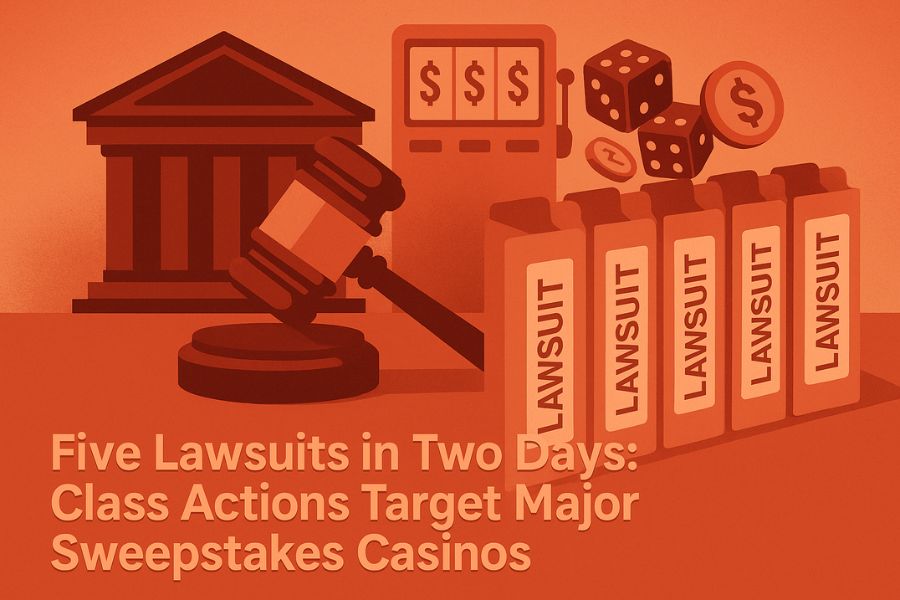Online “social” casinos are under fresh legal fire. Since October 28, 2025, five class action lawsuits were filed in quick succession against well-known sweepstakes operators. The cases, spread across Utah, Ohio, and Missouri, claim certain sites are really illegal gambling dressed up as free-to-play games.
Plaintiffs say they bought virtual coins, lost money, and now want refunds and other relief. The companies named include FSG Digital, High 5 Games, Stake.us (plus celebrity promoters), Yellow Social Interactive (Pulsz), and The Money Factory.
None of these suits has been decided, and all defendants are presumed innocent unless a court rules otherwise.
The Five New Lawsuits at a Glance
Let’s go through the five new lawsuits against sweeps casinos:
FSG Digital / Seth Schorr (Utah)
A federal case alleges FSG Digital ran an illegal sweepstakes casino through “JefeBet.” The complaint argues the platform mimics real gambling under a social label.
Under Utah law, players who lose money to illegal gambling can try to recover double their losses. The defendants are expected to contest these claims, and no ruling has been made yet.
High 5 Games (Ohio)
A new class action filed in Ohio says High 5 Games offers unlawful gambling through its online titles. The plaintiff asks the court to declare the games violate federal and state law and to void certain terms of service.
This comes the same year other courts scrutinized social casino models that sell virtual chips for extended play.
Yellow Social Interactive / Pulsz (Utah)
A Utah filing targets Yellow Social Interactive (operator of Pulsz). The suit contends the site sells sweepstakes coins while delivering what is, in practice, an online casino.
The plaintiff seeks refunds and an order stopping the alleged conduct. The company has previously denied wrongdoing in related matters.
The Money Factory (Utah)
A separate Utah case names The Money Factory. The complaint claims the site disguises gambling as a sweepstakes product. Like the other suits, it asks for monetary recovery and a jury trial.
The legal question is whether the model crosses from “promotions” into illegal gambling under state law.
Stake.us / Drake / Adin Ross (Missouri)
A state case in Missouri claims Stake.us, Drake, and streamer Adin Ross promoted a deceptive gambling scheme. A related filing in New Mexico followed.
The suits argue the platform lets users buy credits, play casino-style games, and convert winnings into value, making it gambling in everything but name. Stake and the celebrities have pushed back on the allegations.
Why These Cases Matter for Players and Operators
First, the filings show how fast legal pressure is rising on sweepstakes casinos. In two days, five separate complaints landed in multiple courts. If judges agree these models are illegal, operators could face refunds, penalties, or injunctions. That could reshape the way “social” casinos sell coins, bonuses, and entry methods.
Second, the stakes go beyond one brand. In February 2025, a jury in Washington ordered High 5 Games to pay nearly $25 million in a class action over a similar social casino structure. While that case involved different facts and law, it signals courts are looking closely at virtual chips and whether players can really “win” in a way that has value. These new lawsuits will test similar arguments in new states.
Third, users should understand how these sites work. Many sweepstakes platforms let you play for free with daily coins, but they also sell packages that include “Gold Coins” and “Sweeps Coins.” The rules vary, but plaintiffs argue that buying coins to keep spinning, coupled with the chance to redeem, makes it real gambling. Operators counter that their promotions comply with sweepstakes rules and don’t allow traditional cash wagers.
Finally, nothing is decided yet. Complaints are the start of a case, not the end. Defendants will likely move to dismiss, dispute the facts, or argue the models fit within existing laws. Outcomes could include dismissals, settlements, or court orders changing how these sites operate. Readers should follow updates before drawing firm conclusions.




